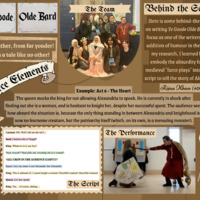Writing for the Mediaeval Play, "Ye Good Old Bard"
Item
Title
Writing for the Mediaeval Play, "Ye Good Old Bard"
Description
Our play, Ye Goode Olde Barde, was a group effort to put on a collaborative performance inspired by medieval theater. As one of the writers, my responsibilities included incorporating humour into our script. I began by researching how comedy was commonly used in medieval theater. In my writing, I incorporated knowledge on medieval “farce plays” which utilized elements such as absurdity and parody, usually to mock the status quo or to simply tell a funny story. These elements assisted in the telling of our play, which was naturally absurd in nature.
The play is about a woman named Alexandria seeking glory and knighthood. Of course, during the medieval period, women having such dreams was an uncommon trope, which is what made the narrative absurd. However, our writing team took a more feminist approach to tell Alexandria’s story. The farcical elements were helpful as they allowed us to mock typical patriarchal expectations of women whilst simultaneously delivering a humorous performance. In her journey, Alexandria hides her identity as a woman, disguised as a squire named Alexander. As a first step towards knighthood, she agrees to find the king’s missing wife. She overcomes numerous obstacles in her quest, such as The Troll who just wants to be left alone, The Trickster Fairy who wants Alexandria’s real name, and The Dragon who is seemingly “hiding” the queen in his lair. Alexandria helps every single creature overcome their own problems whilst “fighting” them, and in turn, learns that she too no longer wants to hide her true identity.
When she brings back the queen safely and the king agrees to knight her, she reveals she is a woman to the whole audience. The king is shocked, but eventually agrees to knight her due to her heroic efforts (and after some convincing from the queen, who ridicules him throughout the process). Once again, the farcical elements helped us to tell this story because it was uncommon for a woman to be knighted during the medieval period, but we wanted Alexandria to realize her dreams anyway. Though we are far past the medieval period, farce plays and their impact can still be found today. For example, in today’s time, satirical media outlets often use similar farcical elements, such as ridiculing, to discuss political and social problems!
The play is about a woman named Alexandria seeking glory and knighthood. Of course, during the medieval period, women having such dreams was an uncommon trope, which is what made the narrative absurd. However, our writing team took a more feminist approach to tell Alexandria’s story. The farcical elements were helpful as they allowed us to mock typical patriarchal expectations of women whilst simultaneously delivering a humorous performance. In her journey, Alexandria hides her identity as a woman, disguised as a squire named Alexander. As a first step towards knighthood, she agrees to find the king’s missing wife. She overcomes numerous obstacles in her quest, such as The Troll who just wants to be left alone, The Trickster Fairy who wants Alexandria’s real name, and The Dragon who is seemingly “hiding” the queen in his lair. Alexandria helps every single creature overcome their own problems whilst “fighting” them, and in turn, learns that she too no longer wants to hide her true identity.
When she brings back the queen safely and the king agrees to knight her, she reveals she is a woman to the whole audience. The king is shocked, but eventually agrees to knight her due to her heroic efforts (and after some convincing from the queen, who ridicules him throughout the process). Once again, the farcical elements helped us to tell this story because it was uncommon for a woman to be knighted during the medieval period, but we wanted Alexandria to realize her dreams anyway. Though we are far past the medieval period, farce plays and their impact can still be found today. For example, in today’s time, satirical media outlets often use similar farcical elements, such as ridiculing, to discuss political and social problems!
Contributor
Rijaa Khan

